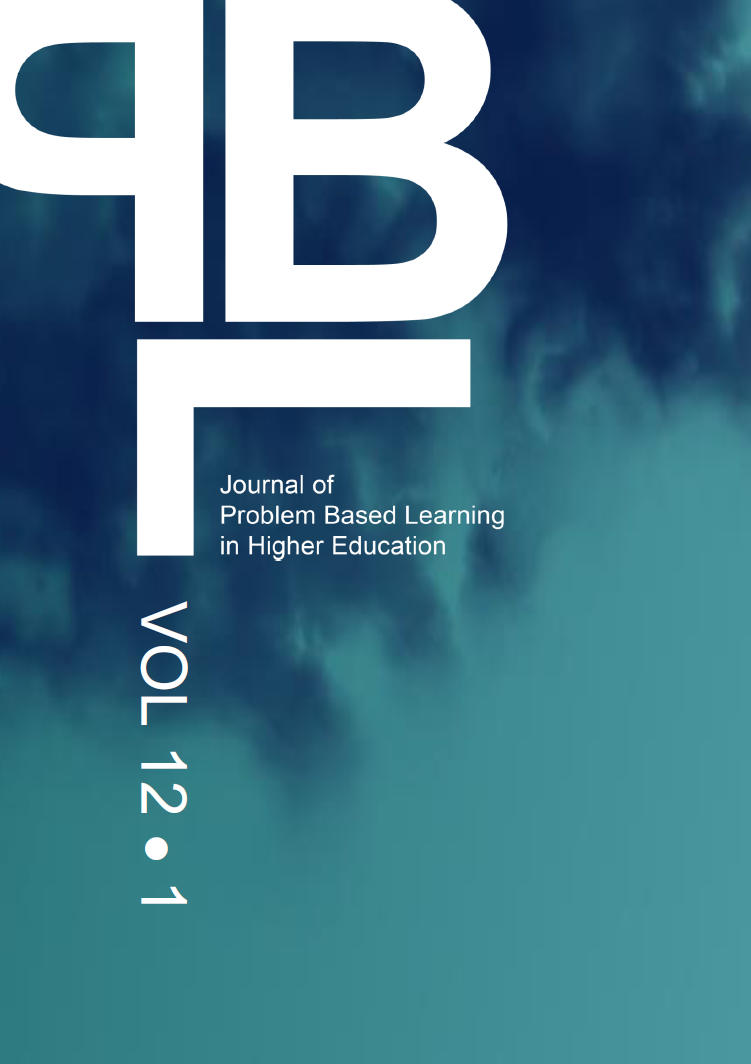Abstract
Even though using group examinations aligns well with the epistemology of problem-based learning (PBL), the dilemma of using joint learning while simultaneously fulfilling individual assessment requirements in higher education make group examinations difficult to use. In this study, the aim was to explore whether an individual reflection paper (IRP) can act as a means to support individual assessment in group examinations in PBL. 152 IRPs were used to assess whether a particular group of students had acquired theoretical and analytical knowledge that would affect results on a group examination. Overall, completed IRPs clearly showed a concurrence between the students’ acquired and requested theoretical and analytical knowledge on the examination, except on a few occasions. These findings are promising and suggest that IRPs can act as a means to support individual assessment in group examinations in PBL and that it is possible to combine joint learning in tutorial groups with individual group work assessment.
References
Abrandt Dahlgren, M., Dahlberg, J., Ekstedt, M., Lind Falk, A., Sjögren, E., & Törnqvist, T. (2016). PBL-guiden: En handbok för problembaserat lärande vid Medicinska fakulteten [The PBL guide: A handbook for problem-based learning at the Faculty of Medicine]. https://docplayer.se/32808445-Pbl-guiden-handbok-i-problembaserat-larande-for-studenter-och-larare-vid-medicinska-fakulteten.html
Azer, S. A., & Azer, D. (2015). Group interaction in problem-based learning tutorials: A systematic review. European Journal of Dental Education 19(4), 194–208. https://doi.org/10.1111/eje.12121
Barnett, R. (2012). Learning for an unknown future. Higher Education Research & Development 31(1), 65–77. https://doi.org/10.1080/07294360.2012.642841
British Psychological Society. (2014). Code of human research ethics. https://www.bps.org.uk/news-and-policy/bps-code-human-research-ethics-2nd-edition-2014
Dijkstra, J., Latijnhouwers, M., Norbart, A., & Tio, R. A. (2016). Assessing the “I” in group work assessment: State of the art and recommendations for practice. Medical Teacher, 38(7), 675–682. https://doi.org/10.3109/0142159X.2016.1170796
Forsell, J., Forslund Frykedal, K, & Hammar Chiriac, E. (2021). Teachers’ perceived challenges in group work assessment. Cogent Education 8 (1). https://doi.org/10.1080/2331186X.2021.1886474
Hammar Chiriac, E., & Forslund Frykedal, K. (2023). Individual group work assessment in cooperative learning: Possibilities and challenges. In R. Gillies, N. A. Davidson, & B. Mills (Eds.), Contemporary global perspectives on cooperative learning (pp. 94–108). Routledge. https://doi.org/10.4324/9781003268192-10
Hmelo-Silver, C. E. (2004). Problem-based learning: What and how do students learn? Educational Psychology Review, 16(3), 235–266. https://doi.org/10.1023/B:EDPR.0000034022.16470.f3
Johnson, D. W., & Johnson, F. P. (2013). Joining together: Group theory and group skill (11th ed.). Allyn & Bacon.
Johnson, D. W., & Johnson, R. T. (2014). Cooperative learning in the 21st century. Annals of Psychology, 30(3), 841–851. https://doi.org/10.6018/analesps.30.3.201241
Johansson, M., Sandén, P., & Johansson, A. (2012). Individuella basgruppsunderlag: Ett verktyg för synliggörande av individuell kunskapsinhämtning och bearbetning samt reflektion i basgruppsarbetet [Individual reflection paper: A tool for making visible individual knowledge acquisition and processing as well as reflection in tutorial group work]. In CUL-Rapport 16 (pp. 122–136). Linköpings Universitet.
Johansson, M., & Svensson, T. (2019). Individual reflection paper—Supporting students learning in the critical phase of self-directed learning in PBL. Journal of Problem Based Learning in Higher Education, 7(1), 97–106. https://doi.org/10.5278/ojs.jpblhe.v7i1.2418
Jones, S. (2013). Using problem-based learning for the acquisition of psychological knowledge and understanding. Psychology Teaching Review, 19(2), 38–48. https://doi.org/10.53841/bpsptr.2013.19.2.38
Meijer, H., Hoekstra, R., Brouwer, J., & Strijbos, J. (2020). Unfolding collaborative learning assessment literacy: A reflection on current assessment methods in higher education.” Assessment & Evaluation in Higher Education 45(8), 1222–1240. https://doi.org/10.1080/02602938.2020.1729696
Moallem, M., Hung, W., & Dabbagh, N. (Eds.). (2019). The Wiley handbook of problem-based learning. Wiley. https://doi.org/10.1002/9781119173243
Orr, S. (2010). Collaborating or fighting for the marks? Students’ experiences of group work assessment in the creative arts. Assessment & Evaluation in Higher Education, 35(3), 301–313. https://doi.org/10.1080/02602931003632357
Rosander, M., & Hammar Chiriac, E. (2016). The purpose of tutorial groups: Social influence and the group as means and objective. Psychology Learning & Teaching, 15(2), 155–167. https://10.1177/1475725716643269
Savin-Baden, M., & Howell, C. (2004). Foundations of problem-based learning. McGraw-Hill Education.
Steel, A., Higgins, A., & Laurens, J. (2014). Valuable learning, unwelcome assessment: What LLB and JD students really think about group work. Sydney Law Review, 36(2), 291–221. https://ssrn.com/abstract=2484379
Swedish Research Council. (2017). Good research practice.
Underwood, J. D. M. (2003). Student attitudes towards socially acceptable and unacceptable group working practices. British Journal of Psychology, 94(3), 319–337. https://doi.org/10.1348/000712603767876253
Tan, J. P-L., Choo, S. S., Kang, T., & Liem, G. A. D. (2017). Educating for twenty-first century competencies and future-ready learners: research perspectives from Singapore. Asia Pacific J. Education 37(4), 425–436. https://doi.org/10.1080/02188791.2017.1405475
van Aalst, J. (2013). Assessment in collaborative learning. In C. E. Hmelo-Silver, C. A. Chinn, C. K. K. Chan, & A. M. O’Donnell (Eds.), The international handbook of collaborative learning (pp. 280–296). Routledge.
Wiggins, S., Hammar Chiriac, E., Larsson Abbad, G., Pauli, R., & Worell, M. (2016). Ask not only “What can PBL do for psychology?” but “What can psychology do for PBL?” A review of the relevance of problem-based learning for psychology teaching and research. Psychology Learning & Teaching, 15(2), 136–154. https://doi.org/10.1177/1475725716643270
Yew, E. H. J., & Goh, K. (2016). Problem-based learning: An overview of its process and impact on learning. Health Professions Education, 2(2), 75–79. https://doi.org/10.1016/j.hpe.2016.01.004

This work is licensed under a Creative Commons Attribution 4.0 International License.
Copyright (c) 2024 Eva Hammar Chiriac
